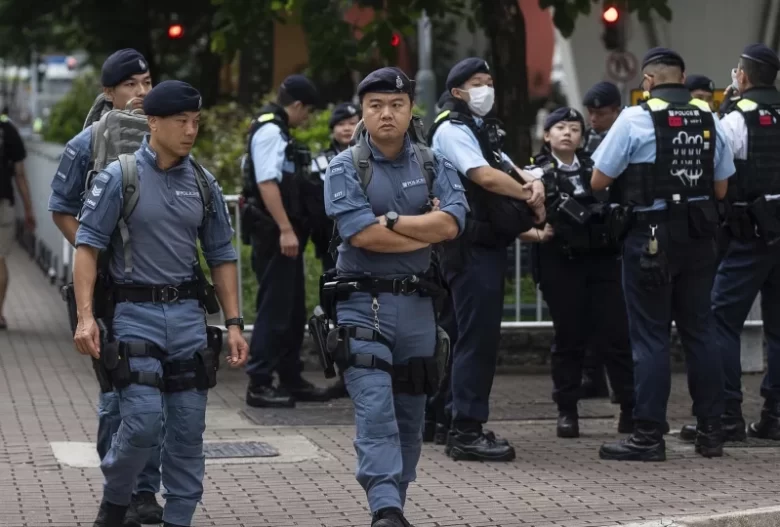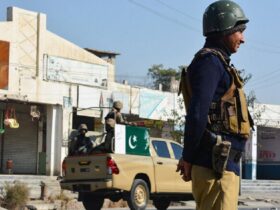Fourteen pro-democracy activists were convicted in Hong Kong’s largest national security case on Thursday by a court that found their plan to effect change through an unofficial primary election would have undermined the government’s authority and created a constitutional crisis.
Since the 2019 protest movement that brought massive demonstrations to the city’s streets, authorities have largely silenced dissent in Hong Kong by reducing public choice in elections, cracking down on media, and enforcing the Beijing-imposed security law under which the activists were convicted.
Former lawmakers Leung Kwok-hung, Lam Cheuk-ting, Helena Wong, and Raymond Chan were among those found guilty of conspiracy to commit subversion.
They could face up to life in prison when sentenced. Former district councillors Lee Yue-shun and Lawrence Lau were acquitted, but the prosecution plans to appeal these acquittals.
The activists were part of a group of 47 democracy advocates prosecuted in 2021 for their involvement in an unofficial primary election.
Prosecutors accused them of attempting to paralyze Hong Kong’s government and overthrow the city’s leader by securing a legislative majority to indiscriminately veto budgets.
In a summary of the verdict distributed to the media, the court stated that the election participants had declared they would “either actively use or use the power conferred on the [Legislative Council] by the [Basic Law] to veto the budgets.”
The Basic Law stipulates that the chief executive can dissolve the legislature if a budget cannot be passed, but must step down if the budget is vetoed again in the newly formed legislature.
The court also stated in the full 319-page verdict that if the plan to veto bills led to the dissolution of the legislature, it would mean “the implementation of any new government policies would be seriously hampered and essentially put to a halt.”
“In our view, the power and authority of both the Government and the Chief Executive would be greatly undermined,” the court stated in the verdict. “That would create a constitutional crisis for Hong Kong.”
The judges concluded that the definition of “unlawful means” is not restricted to criminal acts, and it was not required for the prosecution to prove that the accused were aware that the means used were “unlawful”.
Lau, who was acquitted, emphasized to reporters that the focus should not be on him at the moment, as other defendants in the case deserve the public’s concern and support.
He suggested that if there is any standout aspect of the case, it should be the judgment itself, as it outlined the logic and perspectives of the judges. “This reflects our commitment to the rule of law,” he added.
Following the court’s findings that Lau had not referenced vetoing the budget in his election campaign and lacked intent to subvert state power, he was acquitted.
Expressing appreciation for the public’s support throughout the past years, Lee, the other defendant found not guilty, stated, “I feel calm, as I have always been.”
Earlier, in a Facebook post, he likened Thursday to a unique graduation ceremony, although typically, graduations involve sharing happiness with family and friends.
Lee had expressed, “This perhaps best reflects the common helplessness of our generation,” in his post on Wednesday.
Similarly to Lau, Lee was acquitted after the court found no evidence that he mentioned vetoing in an election forum, nor had he personally expressed his stance on using veto power to force the government to accede to protester demands.
While Lee, who was a member of the now-defunct Civic Party, had adopted a similar political platform as other party members, the court considered that he joined the party’s campaign for the primary later and would have had little choice but to adopt the platform used by others.
Consequently, the court stated in the verdict that it could not ascertain his intent to subvert state power.
The court decided to keep both individuals on bail.
Observers noted that the subversion case highlights the use of the security law to suppress political opposition in the wake of large anti-government protests in 2019. However, both the Beijing and Hong Kong governments have asserted that the law has played a role in restoring stability in the city and have emphasized the protection of judicial independence.
When Britain handed Hong Kong back to China in 1997, Beijing pledged to uphold the city’s Western-style civil liberties for 50 years.
Nevertheless, since the introduction of the 2020 law, Hong Kong authorities have significantly restricted free speech and assembly in the name of national security.
Numerous activists have been arrested, silenced, or forced into self-exile, and dozens of civil society groups have disbanded.
Legal scholar Benny Tai, former student leader Joshua Wong, and a dozen former lawmakers, including Leung and Claudia Mo, were among the activists prosecuted in the main case.
Of the group, thirty-one, including Tai, Wong, and Mo, admitted to the charge of conspiracy to commit subversion. They stand a better chance at receiving shorter jail terms and will be sentenced at a later date.
For the remaining sixteen who pleaded not guilty and underwent a non-jury trial, the court tentatively scheduled a mitigation hearing on June 25 following Thursday’s verdicts.
On Thursday, prior to the court hearing, Chan Po-ying, the leader of the pro-democracy political party League of Social Democrats, along with three other LSD members, was arrested at court. This was reported in a Facebook post by party member Figo Chan. Chan Po-ying is also the wife of Leung.
According to reports from local media outlets like the South China Morning Post, those arrested had attempted to raise a yellow banner in protest as they walked onto court grounds but were stopped by police and escorted away.
Diplomats from the United States, Australia, and Britain, as well as dozens of residents, waited outside the police-guarded court building to secure seats and hear the verdicts.
Former chairperson of the Democratic Party, Emily Lau, was among those who showed up in support.
While speaking to reporters, she expressed sadness over the lengthy incarceration of many individuals but chose not to comment on the verdict.
Social worker Stanley Chang, a friend of one of the 16 defendants, reached the site at 4 a.m. apprehensive about securing a seat.
He noted the limited ways supporters could assist and viewed attending the hearing as a form of companionship. “I want to offer support for my friend and the individuals I saw in news reports,” he expressed.
Maya Wang, acting China director at Human Rights Watch, denounced the convictions of 14 individuals, citing their peaceful activism as evidence of “utter contempt for both democratic political processes and the rule of law.”
“All Hong Kong people wanted was a chance to freely elect their government. Democracy is not a crime, regardless of what the Chinese government and its handpicked Hong Kong court may say,” Wang emphasized.
Sarah Brooks from the rights group Amnesty International characterized the mass convictions as “unprecedented” and described them as the “most ruthless illustration yet of how Hong Kong’s National Security Law is weaponized to silence dissent”.
She further stated, “These convictions also send a chilling message to anyone else in Hong Kong who opposes the actions of the government, namely: stay quiet, or face jail.”
The unofficial primary held in June 2020 aimed to shortlist pro-democracy candidates for the official election. It attracted an unexpectedly high turnout of 610,000 voters, which accounted for over 13% of the city’s registered electorate.
At that time, the pro-democracy camp hoped to secure a legislative majority, enabling them to advocate for the 2019 protest demands, such as greater police accountability and democratic elections for the city leader.
However, the government postponed the legislative election scheduled to follow the primary, citing public health risks during the coronavirus pandemic.
Subsequently, electoral laws were overhauled, effectively augmenting the number of pro-Beijing lawmakers in the legislature.
YOU MAY ALSO READ: Notorious terrorists’ commander Lawal Kwalba surrenders to Nigerian troops









Got a Question?
Find us on Socials or Contact us and we’ll get back to you as soon as possible.